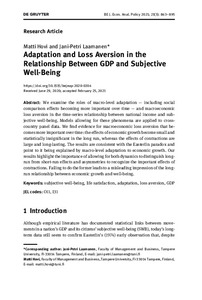Adaptation and loss aversion in the relationship between GDP and subjective well-being
Hovi, Matti; Laamanen, Jani Petri (2021)
Hovi, Matti
Laamanen, Jani Petri
2021
This publication is copyrighted. You may download, display and print it for Your own personal use. Commercial use is prohibited
Julkaisun pysyvä osoite on
https://urn.fi/URN:NBN:fi:tuni-202112078936
https://urn.fi/URN:NBN:fi:tuni-202112078936
Kuvaus
Peer reviewed
Tiivistelmä
We examine the roles of macro-level adaptation - including social comparison effects becoming more important over time - and macroeconomic loss aversion in the time-series relationship between national income and subjective well-being. Models allowing for these phenomena are applied to crosscountry panel data. We find evidence for macroeconomic loss aversion that becomes more important over time: the effects of economic growth become small and statistically insignificant in the long run, whereas the effects of contractions are large and long-lasting. The results are consistent with the Easterlin paradox and point to it being explained by macro-level adaptation to economic growth. Our results highlight the importance of allowing for both dynamics to distinguish longrun from short-run effects and asymmetries to recognize the important effects of contractions. Failing to do the former leads to a misleading impression of the longrun relationship between economic growth and well-being.
Kokoelmat
- TUNICRIS-julkaisut [16944]
